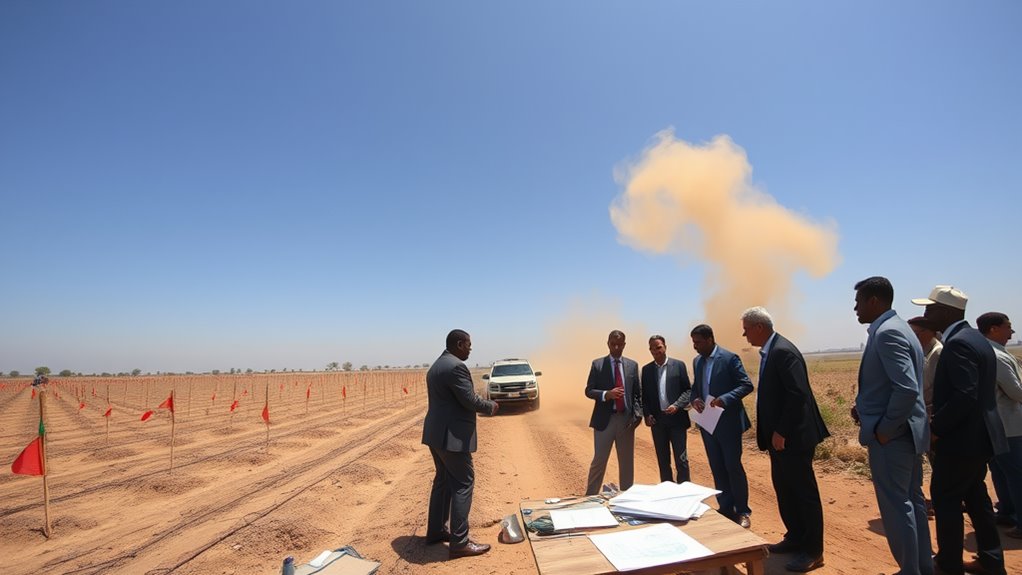To succeed in land deals, you’ll need to identify undervalued parcels by researching zoning regulations and public records. Building a strong network with motivated sellers, real estate agents, and title companies is key. Negotiate favorable terms by leveraging local zoning knowledge and seller financing options. Maintain a reliable pipeline of leads through direct mail campaigns and consistent follow-up. Mastering how wholesaling land deals will reveal hidden opportunities you won’t want to miss.
Key Takeaways
- Research local zoning laws to identify overlooked parcels with high potential value.
- Analyze public records and tax evaluations to find long-held, distressed properties.
- Build a network of motivated sellers and buyers to secure profitable deals.
- Use direct mail campaigns to target long-term landowners and uncover hidden opportunities.
- Negotiate favorable terms by understanding zoning regulations and leveraging seller financing options.
Wholesaling Land Deals – Identifying Undervalued Parcels
When searching for undervalued parcels, you’ll find that success often hinges on meticulous research and strategic networking. Start by diving into local zoning laws and property use restrictions to identify parcels others may overlook. Public records and county tax evaluations are goldmines for finding properties held long-term, which could signal distressed properties or motivated sellers ready to negotiate. Direct mail campaigns targeting landowners who’ve held parcels for over a decade can uncover hidden gems. Networking with builders and developers offers a competitive edge, as they often have insights into areas with upcoming demand. Don’t skip analyzing comparable sales—they’re critical for evaluating a parcel’s true market value. Incorporate the sales comparison approach by researching recent sales of similar properties to gauge accurate pricing trends. By combining these strategies, you’ll position yourself to spot undervalued parcels that align with your investment goals while staying ahead of the competition. Stay diligent, and the deals will follow.
Understanding Zoning Regulations
Zoning regulations shape the potential of every parcel, directly influencing its value and appeal. As a real estate investor, you can’t overlook the importance of understanding permissible uses dictated by local ordinances. Each zoning classification—residential, commercial, industrial, or agricultural—impacts what you can develop and who your buyers might be. For instance, an R1 designation limits single-family homes, while a C classification opens opportunities for retail or office space. Staying informed about zoning changes is essential. Community growth often drives these shifts, creating opportunities to access undervalued land before others catch on. When market demand aligns with zoning updates, you’re positioned to make strategic investment decisions. Always research current zoning classifications and anticipate future trends. This knowledge allows you to identify parcels with untapped potential, maximizing returns while minimizing risks. In land wholesaling, mastering zoning regulations isn’t optional—it’s your edge. Timber farms offer long-term appreciation potential and align well with agricultural zoning, making them a sustainable investment option.
Building a Strong Network

While mastering zoning regulations is essential, building a strong network can greatly amplify your success in land wholesaling. Start by connecting with motivated sellers who need to offload properties quickly, often leading to lucrative deals. Cultivate relationships with potential buyers who are actively seeking land for development or passive income. Partner with local real estate agents to gain insights into market trends and access distressed properties that aren’t listed publicly. Collaborating with title companies can streamline closings and build trust for future transactions. Attend real estate investment groups to exchange strategies and expand your network with like-minded professionals. Attending real estate meetups can provide valuable networking opportunities and foster shared insights among industry peers. Finally, leverage online platforms to reach a wider audience of buyers and sellers, increasing your chances of securing profitable deals. A robust network not only provides opportunities but also positions you as a go-to resource in the land wholesaling industry. Focus on nurturing these connections for long-term success.
Negotiating Favorable Terms
To secure the best deals in land wholesaling, you must master the art of negotiation. Your ability to build rapport with motivated sellers and uncover their unique motivations will position you to negotiate favorable terms. Always guarantee your purchase contract includes an assignment clause, allowing seamless transfer to your buyer. Here are three strategies to elevate your negotiation game:
- Leverage Seller Financing: Offering flexible payment options can make your deal irresistible to sellers while broadening your buyer pool. Ensure all agreements are documented with promissory notes to formalize terms and protect both parties.
- Clarify Expectations Early: Address potential misunderstandings upfront to guarantee a smooth transaction and maintain trust throughout.
- Utilize Local Zoning Knowledge: Highlight the property value by emphasizing its permitted uses, easing concerns and justifying your offer.
Maintaining a Reliable Pipeline of Leads

Succeeding in land wholesaling hinges on your ability to maintain a steady flow of leads. Start by targeting motivated sellers through direct mail campaigns, focusing on landowners who’ve held properties for over a decade or reside outside the county. Sending 2,700 postcards can yield significant lead generation opportunities. Build strong relationships with real estate agents and local title companies to establish credibility and access deals off-market. Consistently follow up with potential sellers to nurture trust and close land deals faster. Don’t overlook online platforms—leverage social media and listing sites to promote your inventory and attract buyers. Additionally, monitor property tax records to identify landowners who might be inclined to sell. Combine these strategies with ReferralExchange to tap into a network of professional referrals and further expand your pipeline. By combining these strategies, you’ll create a robust pipeline that fuels your wholesaling success and keeps you ahead in the competitive land market.
Conclusion
Unlock the secrets to lucrative land deals by mastering undervalued parcels, zoning intricacies, and strategic networking. But remember, the true edge lies in your ability to negotiate like a pro and keep your pipeline overflowing with opportunities. Miss one step, and you could lose the deal of a lifetime. Stay sharp, stay ahead, and watch as your portfolio grows—if you dare to play the game right.




